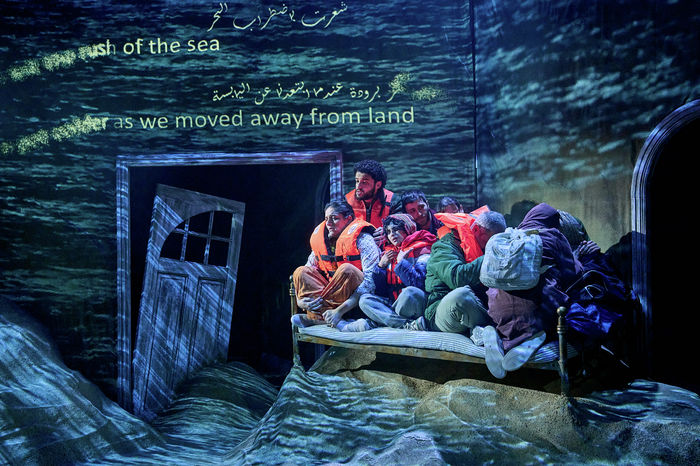The Beekeeper of Aleppo has much to teach Cambridge theatregoers
The audience at the Cambridge Arts Theatre will no doubt be exclusive and homogenous — but they are also the ones with most to learn

Sitting in the theatre while watching The Beekeeper of Aleppo, it suddenly dawned on me that I had no idea how the war in Syria began. Perhaps that’s not a relatable experience; perhaps many of you are well versed in the history of Syria, and perhaps some of you have lived it. It’s an ignorance that I hesitate to admit to, if I’m honest.
I thought about coming away and talking about how Beekeeper finds itself in the precarious position of trying to give an audience in Cambridge’s most expensive theatre a crash-course in caring, but evidently it was a lesson that I myself needed to learn. I let myself sit complacently in the audience, sipping wine from one of the three bars in the Arts Theatre, trying to jot notes that felt appropriately witty and measure the performance’s worth in stars. Perhaps even now I’m letting myself wallow in a shallow Western guilt that the production so wryly pokes at, with a man who promises to smuggle the protagonists Nuri (played by understudy Aram Mardourian) and Afra (Roxy Faridany) telling them that Britain used to favour Afghani asylum seekers, now Syrians, and “tomorrow, who knows”.
“Perhaps this is the same audience that needs a lesson in radical compassion and community the most”
The play seems to try every way of getting us on its side. It goes from trapping Nuri and Afra in the endlessly complex and useless British bureaucracy, to jabbing at the United Kingdom itself, with its rain and queues and sarcasm, to making a slightly odd U-turn and presenting England as some verdant Holy Grail that the characters must stumble towards. One thing it never really relents on, though, is its total inversion of the racial othering so commonly perpetrated in this country. In the world of Beekeeper, British people are strange foreigners who don’t know how to behave, don’t know what the real world is like, don’t understand how to act around our Syrian protagonists. Where the Arab world is vibrant, diverse and familiar to the characters, Europe represents a grey, indistinguishable mass of crime, incompetence and violence, where they are amazed to find that flowers and bees can exist as they do in West Asia.
At least in the first half, it was refreshing to hear refugees speak of England as a last resort rather than a glowing motherland. England is too cold, too broken, too far away, and none of the characters want to go there — particularly if it means leaving their beautiful home among the spice stalls and honey shops of Aleppo. Perhaps as a second generation immigrant this is a strange stance for me to take, when my grandmother fought so many battles in bringing her daughters here, where I have found so much privilege. The fact remains, however, that England has had more than her fair share of exaltation, and the smug fantasy of dazzled refugees tripping over themselves to praise her (especially at the expense of their home countries) is a tired one.
If the production achieved one thing, it was to make me go home and start reading about Syria. So far I’ve learned about the onset of the war, the ‘last gardener of Aleppo’ and Syrian Arabic. I’m well aware that this is the bare minimum, but if every person as ignorant as me who sat in the audience tonight ends the day a little more educated, with a little more perspective, then hopefully it’ll be a start. Because, sad though it may be that this show will probably mostly reach the white middle and upper classes of Cambridge, perhaps this is the same audience that needs a lesson in radical compassion and community the most. Onstage, the play’s borders became oxymoronic: simultaneously shown to be totally redundant and yet crucial for our characters. The play, incessantly interrogating these subjunctive sites of conflict, ultimately challenges us to let go of these artificial and destructive lines in the sand and to embrace a world in which we, like a hive of bees, are free to come and go in order to sweeten both our individual communities and the wider world around them.
The Beekeeper of Aleppo is showing at the Cambridge Arts Theatre from Tuesday 16th to Saturday 20th May, 7:30pm.
 Comment / Cambridge’s tourism risks commodifying students18 April 2025
Comment / Cambridge’s tourism risks commodifying students18 April 2025 News / Cambridge student numbers fall amid nationwide decline14 April 2025
News / Cambridge student numbers fall amid nationwide decline14 April 2025 News / Greenwich House occupiers miss deadline to respond to University legal action15 April 2025
News / Greenwich House occupiers miss deadline to respond to University legal action15 April 2025 Comment / The Cambridge workload prioritises quantity over quality 16 April 2025
Comment / The Cambridge workload prioritises quantity over quality 16 April 2025 Sport / Cambridge celebrate clean sweep at Boat Race 202514 April 2025
Sport / Cambridge celebrate clean sweep at Boat Race 202514 April 2025





